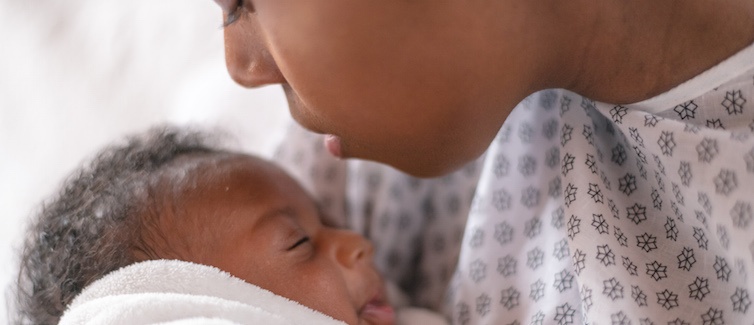Pregnancy and childbirth can be an exciting time for mothers, but it also can be a difficult one.
Physical changes and challenges can occur for expectant and new mothers, but so can mental health challenges. Between 20-25 percent of mothers suffer from perinatal mood and anxiety disorders (PMADs), according to the National Perinatal Association.
Black mothers may face even more challenges. They are more at risk of PMADs but are less likely to receive treatment.
UPMC Magee-Womens Behavioral Health Services, in conjunction with UPMC Western Psychiatric Hospital, offers treatment for a variety of mental health conditions women may face during pregnancy or after birth. Call 412-641-1238 for more information.
Never Miss a Beat!
Subscribe for More Mental Health News
Thank you for subscribing!
You can now select the specific newsletters you'd like to receive.
You are already subscribed.
Subscribe to more newsletters in our email preference center.
Sorry, an error occurred. Please try again later.
Get Mental Health Tips Sent to Your Phone!
Mental Health Challenges for Mothers
Perinatal mood and anxiety disorders can occur during pregnancy and up to a year post-birth.
Common PMADs include depression during pregnancy, anxiety, post-traumatic stress disorder, and postpartum depression.
Postpartum depression is the most common, affecting about 1 out of 8 mothers in the United States. Although many mothers get “the baby blues,” postpartum depression is a serious condition that lasts much longer. Feelings of emptiness and a lack of connection to their baby can last for weeks or months.
Symptoms of postpartum depression include:
- Crying more often
- Feeling angry
- Withdrawing from others
- Feeling numb, empty, or not connected to your baby
- Worrying about hurting your baby
- Feeling guilty about not being a good mother, or doubting your ability to be a good mother
Mental Health Challenges for Black Mothers
While mothers of any race can face mental health challenges during pregnancy and after childbirth, women of color are especially vulnerable.
Black mothers are much more likely than white mothers to suffer from PMADs like postpartum depression, according to a 2019 study in Archives of Women’s Mental Health.
Close to 40% of Black mothers will suffer from postpartum depression. That’s more than double the rate for the general population.
Factors like socioeconomic status and systemic racism play a role in why women of color are more likely to suffer from PMADs. Risk factors include:
- Lack of access to high-quality medical care
- Higher risk of pregnancy and childbirth complications: Black mothers are four times more at risk of maternal mortality than white mothers.
- Lack of social support
- Gaps in medical insurance
- Financial barriers, including lack of paid time off from work
- Unsafe neighborhoods
- Increased stress
- Exposure to trauma
Maternal Mental Health Treatment
While Black mothers are more likely to suffer from PMADs, they also are less likely to receive treatment. According to a report in Psychiatric Services, Black women were less likely than white women to initiate or continue treatment for postpartum depression.
Many different factors may play a role in why Black mothers don’t begin or continue treatment:
- Lack of access to quality health care
- Distrust in health care system
- Lack of diversity in health care
- Less screening for mental health conditions in women of color
- Mental stigma
- Lack of insurance
- Finances
Getting treatment for mental health conditions during pregnancy and after birth is important. Without treatment, mothers are more at risk for issues like substance abuse, birth complications, pregnancy-related death, and suicide. PMADs may also cause problems with the baby, including problems with behavioral and cognitive development.
Treatment can include medications, therapy, or a mixture of both. Doctors should consider whether a mother is breastfeeding when prescribing antidepressants, most of which are considered safe to use in lactation.
If you are pregnant or recently gave birth and are suffering from a mental burden, help is available at UPMC. Call UPMC Magee-Womens Behavioral Health Services at 412-641-1238 for more information or to schedule an appointment.

Sources
American Psychiatric Association, Mental Health Disparities:Diverse Populations. https://www.psychiatry.org/psychiatrists/cultural-competency/education/mental-health-facts
Centers for Disease Control and Prevention, Depression Among Women. https://www.cdc.gov/reproductivehealth/depression/#post
Katy Backes Kozhimannil, PhD, Connie Mah Trinacty, PhD, Alisa B. Busch, MD, Haiden A. Huskamp, PhD, and Alyce S. Adams, PhD, Psychiatric Services, Racial and Ethnic Disparities in Postpartum Depression Care Among Low-Income Women. https://www.ncbi.nlm.nih.gov/pmc/articles/PMC3733216/#!po=66.0000
March of Dimes, Here Is Why We Need Black Maternal Mental Health Week. https://newsmomsneed.marchofdimes.org/hot-topics/here-is-why-we-need-black-maternal-mental-health-week/
National Perinatal Association, Perinatal Mood and Anxiety Disorders. http://www.nationalperinatal.org/resources/Documents/Position%20Papers/2018%20Position%20Statement%20PMADs_NPA.pdf
NPR, Black Mothers Get Less Treatment for Their Postpartum Depression. https://www.npr.org/sections/health-shots/2019/11/29/760231688/black-mothers-get-less-treatment-for-their-postpartum-depression
Christine Pao, Jerry Guintivano, Hudson Santos, Samantha Meltzer-Brody, Archives of Women's Mental Health, Postpartum Depression and Social Support in a Racially and Ethnically Diverse Population of Women. https://link.springer.com/article/10.1007/s00737-018-0882-6
About UPMC Western Behavioral Health
UPMC Western Psychiatric Hospital is the hub of UPMC Behavioral Health, a network of community-based programs providing specialized mental health and addiction care for children, adolescents, adults, and seniors. Our mission is to provide comprehensive, compassionate care to people of all ages with mental health conditions. UPMC Western Psychiatric Hospital is a nationally recognized leader in mental health clinical care, research, and education. It is one of the nation’s foremost university-based psychiatric care facilities through its integration with the Department of Psychiatry of the University of Pittsburgh School of Medicine. We are here to help at every stage of your care and recovery.
